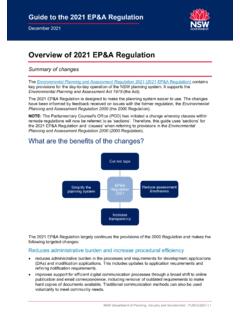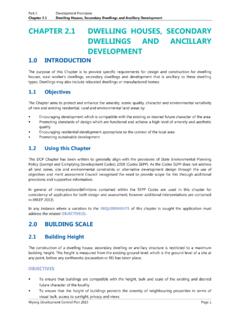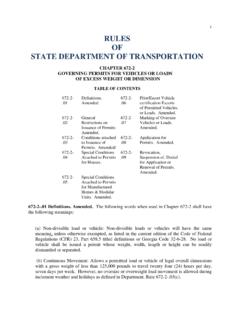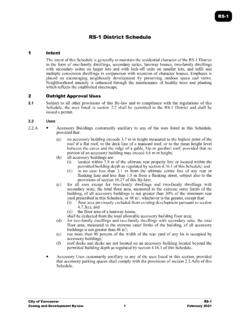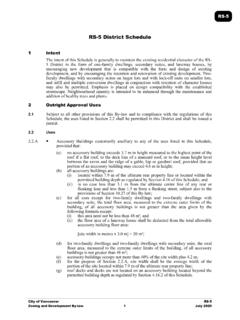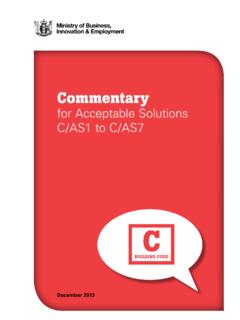Transcription of Short Term Rental Accommodation (STRA)
1 Short Term Rental Accommodation (STRA) Emergency Information Factsheet Guide for Hosts NSW Department of Planning, Industry and Environment | 1 September 2021 About this document This document should be read in conjunction with the FAQs about STRA available on the Department of Planning, Industry and Environment website, and the STRA Code of Conduct. Although this document is designed to be a guide for hosts and agents about complying with the NSW Short -Term Rental Accommodation Fire Safety Standard ( the Standard ), it is not a substitute for the Standard. You must read and comply with the Standard. This document will help you to prepare an Information/Advice Sheet which is part of what you need to do to comply. New rules for Short Term Rental Accommodation in NSW From 1 November 2021, new rules will apply for Short -term Rental Accommodation (STRA) in NSW, including a new planning framework, fire safety standards and a new Government-run STRA Register.
2 There is also a mandatory Code of Conduct and changes to strata legislation. Hosts and agents are required to comply with the Standard and confirm this compliance when registering and renewing registration with the NSW STRA Register. When you register a dwelling on the STRA Register, you will need to declare that it complies with the new Fire Safety Standard. What is the new STRA Fire Safety Standard? The STRA Fire Safety Standard outlines a number of measures that you are legally required to comply with if you provide Short term Rental Accommodation . The Standard provides for the safety of guests and visitors, balancing the need for robust safety requirements and cost prohibitive safety measures. It adopts some standards required of shared Accommodation under the Building Code of Australia (BCA) without requiring a change to the classification to tourist and visitor Accommodation .
3 The new fire safety standards are outlined in the following table. Table 1 Fire Safety requirements for STRA dwellings dwelling type Standard All dwellings Mains-powered smoke alarms or long life, sealed battery-powered smoke alarms in: o dwelling floor levels containing bedrooms, every corridor or hallway associated with a bedroom, or if there is no corridor or hallway, in an area between the bedrooms and the remainder if the building; and o each other storey not containing bedrooms. Smoke alarms must comply with AS 3786. Smoke alarms must be interconnected where there is more than one alarm. Wireless interconnected smoke alarms are permitted. Short Term Rental Accommodation (STRA) Emergency Information Factsheet Guide for Hosts NSW Department of Planning, Industry and Environment | 2 dwelling type Standard All dwellings An Evacuation Plan and signage to familiarise guests with the exit system, including the national emergency services number (000) and advice for guests to download the Emergency+ app.
4 Dwellings in multi-unit buildings only (Dwellings in Class 2 and Class 4 buildings) All entry doors must be openable from inside the dwelling without a key Fire extinguisher and fire blanket in the kitchen secondary dwellings above a garage in single dwelling houses (Class 1a buildings) An inter-connected heat alarm in the garage To clarify: a heat alarm is required where there is an approved secondary dwelling such as a Fonzie flat or studio above the garage of the main dwelling . A standalone dwelling with a garage does not require a heat alarm in the garage. All dwellings An Information Booklet/Advice Sheet on general emergency advice for the STRA and its location. All dwellings STRA hosts and guests are also encouraged to download an appropriate emergency application to their mobile phones that provides sufficient information on potential environmental hazards for the location the STRA.
5 For example: Fires near Me app: developed by NSW Rural Fire Service to provide warnings about bush fires and other incidents. Information on Building Classification can be found here. More information on the Fire Safety rules are in the fact sheet on the STRA website. You must provide Emergency Information Advice for guests Your guests and visitors may not be familiar with the dwelling or surrounding area. Identifying risks and emergency response options for your guests and visitors can save lives. It can also minimise damage to your property and possessions. What kind of information do I have to provide? As a STRA host, you must provide an Information Booklet or Advice Sheet for your guests and visitors that provides general information advice relating to the STRA dwelling .
6 You must prepare clear information for your guests that provides the following information: potential hazards that may affect the dwelling and its location ( bushfires, flooding or coastal erosion and inundation) details regarding identified hazards that affect the STRA dwelling or general locality ( what does a total fire ban mean and what you can and can t do on these days?) Short Term Rental Accommodation (STRA) Emergency Information Factsheet Guide for Hosts NSW Department of Planning, Industry and Environment | 3 details about how guests and visitors can be kept informed in case of an emergency, such as Rural Fire Service and other emergency contact phone numbers, social media pages, or the local radio station frequency how to safely evacuate the dwelling : location of external doors or other safe exit points any information that can assist guests and visitors to know what to do in an emergency recommended evacuation assembly areas.
7 This information can be in the form of a booklet or advice sheet, but it must be easily accessible and available to your guests within the property. Hint: Include this information as part of a Welcome email to your guests and prepare a Welcome package in a bound folder placed somewhere obvious such as on a coffee table or kitchen bench. How do I know what is a potential hazard? The NSW State Emergency Service, the NSW Rural Fire Service and your local Council will have useful information that can assist you to identify potential hazards. You can also source the following websites: Bushfires - NSW Rural Fire Service Floods - NSW SES Storms - NSW SES Urban fires - Fire & Rescue NSW Heatwaves, earthquakes and other disasters - Australian Emergency Management Institute Other emergencies such as tsunami - NSW SES If the property is in a flood-prone or bushfire-prone area, you can consult the the SES Home Emergency Plan online tool for help in identifying hazards.
8 Emergency Evacuation Plan You must have a detailed Evacuation Plan that shows guests and visitors how to exit the dwelling in case of an emergency. Class 2 and Class 4 buildings also need signage that indicates the location of fire safety equipment, and the assembly point. Local information: What numbers should I include? Consider what local emergency services and networks your guests could access in an emergency. Include contact details (including phone number and address) for the following: Local Police station, Fire station, Rural Fire Service, and State Emergency Service Local Hospital, After hours GP or Medical service, and After hours Pharmacy Local contacts for Vet, RSPCA, and WIRES in the case of an emergency affecting animals Local radio station (including frequency) Local Council (find your Council in the Local Government Directory) Other useful contact numbers such as a neighbour that your guests could contact if needed.
9 Include state-wide emergency information / monitoring services: Transport for NSW 24 hour traffic enquiry line ph: 132 701 or for information regarding roads Short Term Rental Accommodation (STRA) Emergency Information Factsheet Guide for Hosts NSW Department of Planning, Industry and Environment | 4 NSW Rural Fire Services fire danger ratings: In bushfire season, suggest guests monitor the fire danger ratings daily NSW State Emergency Service (SES) at on local flood impacts and evacuations during hazardous fire, storm and tsunami events Bureau of Meteorology weather watch: for up to date warnings of flood, severe weather and dangerous surf. Other useful tools for your guests You may identify useful tools that can help your guests to monitor and respond to emergencies.
10 These include: Fires Near Me app, developed by the NSW Rural Fire Service to provide information and warnings about bush fires and other incidents attended to by the NSW Rural Fire Service. General emergency contacts Your Information Booklet or Advice Sheet should also include the state-wide emergency contacts to call in the event of a hazard or emergency, including: Emergency 000 call 000 for police, fire or ambulance for life-threatening emergencies Emergency text call 106 if you are deaf or have a speech or hearing impairment NSW Rural Fire Service call 1800 679 737 for information on fire bans and bushfires NSW State Emergency Service call 132 500 for support and advice in an emergency RSPCA call (02) 9770 7555 to find a shelter, branch, care centre or vet WIRES call 1300 094 747 for emergency advice for injured wildlife Other useful resources The following can help you plan and identify useful information to include for your guests.


